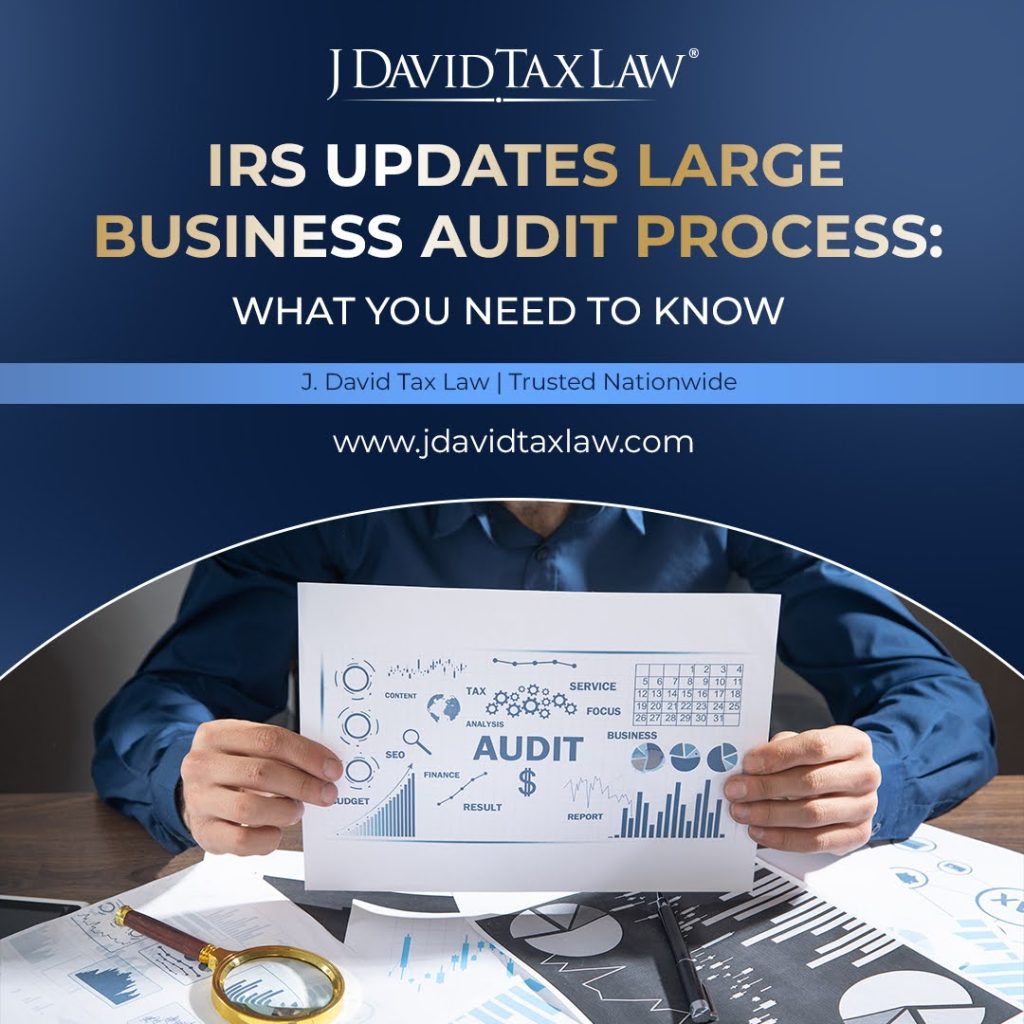Receiving an IRS audit notice can stop you in your tracks. Even if you believe your tax returns are accurate, the idea of an IRS audit brings uncertainty, stress, and the real risk of costly consequences. Whether you’re an individual or a business owner, facing the IRS alone is like stepping into a complex maze without a map.
This guide will show you exactly what to expect during an IRS tax audit, why professional IRS audit representation is essential, and how experienced legal help can provide the protection and clarity you need.
If you want peace of mind, strategic defense, and confidence throughout the process, understanding your options, including IRS audit consultation and qualified audit protection, is the first step toward a stronger financial outcome.
The IRS is Forgiving Millions Each Day. You Could Be Next.
What is a Tax Audit?
A tax audit is a formal review the IRS uses to verify that the details on your tax return are accurate and comply with tax laws. During an audit, the IRS may ask you to provide records that show how you calculated your income, deductions, credits, and other items.
An audit doesn’t always mean you’ve done something wrong. Sometimes, returns are selected randomly or because they contain figures outside typical ranges. However, an IRS audit can quickly lead to significant tax adjustments, additional penalties, and stressful demands for payment, especially if you’re also dealing with state tax debt issues.
This is why many taxpayers choose professional IRS audit representation or audit defense services to protect their rights and ensure every response to the IRS is accurate and well-supported.
Types of IRS Tax Audits
The IRS uses different types of audits to review taxpayers’ records. Each type has a unique process and level of scrutiny. Knowing which kind applies helps you understand what to expect and whether you need professional IRS audit representation.
Correspondence Audit
This is the simplest form of audit. The IRS mails you a letter requesting more details or clarification about specific items on your return. Usually, you respond by sending back documents to support your numbers.
Office Audit
With an office audit, you are required to meet in person with an IRS agent at a local IRS office. These audits often involve questions about multiple areas of your tax return and require detailed records to back up your claims.
Field Audit
A field audit is the most thorough. An IRS agent visits your home or business to examine your records on site. Field audits can be intrusive and time-consuming. This is where skilled IRS audit protection becomes critical to safeguard your rights.
Compliance Audit
A compliance audit takes a broader look at whether you are following tax laws overall. Rather than focusing on a single issue, the IRS reviews multiple aspects of your filings to confirm your compliance across the board. These audits are common in industries or professions with a higher risk of underreporting.
Why Audits Happen
IRS audits don’t happen randomly. The agency uses advanced data systems and screening methods to flag returns that look unusual or carry higher risk. Some of the most common reasons audits are triggered include:
Discrepancies in income reporting. If the income you report doesn’t match the information the IRS receives from employers, banks, or other third parties, it raises a red flag.
Large or unusual deductions. Claiming deductions far beyond what’s typical for your income level can draw attention.
Self-employment income. Sole proprietors and freelancers often face more scrutiny, especially when expenses are high or records are incomplete.
Repeated losses. Reporting business losses year after year can lead the IRS to question whether your business is truly legitimate.
Random selection. Sometimes, returns are chosen simply as part of the IRS’s compliance efforts.
No matter why your return is selected, working with an experienced tax professional or attorney can provide essential IRS audit protection and help you avoid costly missteps.
Many taxpayers choose professional IRS audit representation to prepare a defense and respond strategically to these risks. Solid records and skilled guidance can help protect your finances and avoid escalating problems.
How an Audit Can Affect You Financially
The financial impact of an IRS audit can be significant. If the IRS finds that you owe additional tax, you could also face:
Interest charges. The IRS charges interest on any unpaid tax, calculated from the date the tax was due until it is paid in full.
Penalties. Depending on the issue, penalties may range from a late payment penalty to a 20% accuracy-related penalty. In rare cases, civil fraud penalties of up to 75% can apply.
Increased future scrutiny. Once you’ve been audited, your returns may be more likely to be reviewed again in future years.
Unexpected financial strain. Owing more tax can disrupt your cash flow and impact your ability to meet other financial obligations.
Professional IRS audit representation and audit defense services can help you manage these risks and negotiate for a fair outcome. If you’re unsure how to respond or feel overwhelmed by the potential costs, it’s wise to seek guidance early.
Why Professional IRS Audit Representation Matters
Facing an IRS audit alone can feel overwhelming. Even if you believe your returns are accurate, the audit process is filled with strict deadlines, detailed record requests, and rules that can be easy to overlook. One simple mistake or incomplete response can trigger more penalties, additional taxes, or even years of returns being reopened.
Professional IRS audit representation helps you avoid these risks. An experienced tax attorney knows how to interpret audit notices, gather the right documents, and develop a strategy that protects your interests. Your attorney can:
Explain what the IRS is asking for and why.
Prepare and organize your records to support your position.
Handle all calls, letters, and meetings with IRS agents, so you don’t have to.
Negotiate to reduce tax adjustments, penalties, or interest.
Represent you confidently if you need to appeal an audit decision.
With professional support, you have a stronger defense and a better chance of resolving your audit quickly and fairly.
What to Expect During the IRS Audit Process
While every IRS audit is different, most follow a similar path. Knowing what to expect can help you stay calm and prepared.
1. Receiving the Audit Notice
The process begins when you get an official IRS notice in the mail. This letter explains which tax year is under review, what issues the IRS wants to examine, and what documents you need to provide.
2. Preparing Your Records
You’ll need to gather and organize all relevant documents, such as bank statements, receipts, invoices, and prior tax returns. Having complete, well-organized records is essential to avoid unnecessary penalties.
3. Responding to the IRS
The IRS will set deadlines for providing information. Your representative can submit your documents and communicate with the examiner on your behalf, so you don’t risk saying something that could be misunderstood or used against you.
4. The Review and Findings
The IRS will review your records and may ask follow-up questions. If they find discrepancies, they will issue a report proposing adjustments to your tax liability.
5. Resolution or Appeal
You can agree with the IRS findings and pay any balance due, or you can dispute the results. If you disagree, your tax attorney can negotiate or file an appeal to protect your rights and work toward a fair resolution.
Responding quickly and accurately is critical. Delays or incomplete responses can lead to higher penalties and a weakened defense. Having organized records allows your audit representative to build a solid case and improves your chances of a favorable outcome.
The Audit Representation Process: A Quick Step-by-Step
1. Initial Consultation
A representative reviews your tax returns and financial records to assess your situation.
2. Developing a Defense Strategy
A strategic plan is developed to address issues and prepare supporting documentation.
3. Communication with the IRS
Your representative handles all communication with the IRS, including letters, calls, and meetings.
4. Representation in Audit Interviews
If interviews are required, your representative will present your case and negotiate.
Throughout this process, the goal is to minimize your stress and achieve the most favorable outcome.
Types of Audit Representation Services
When you’re facing an IRS audit, you don’t have to figure it out alone. Several professionals are authorized to represent you and help you build a strong defense:
Certified Public Accountants (CPAs)
CPAs can help you gather records, prepare responses, and handle correspondence with the IRS. They are skilled in accounting details but may not offer legal advice on more complex tax controversies.
Enrolled Agents (EAs)
Enrolled Agents are federally licensed tax professionals who can represent you in audits and appeals. They often focus on compliance and negotiation, but are not attorneys.
Tax Attorneys
Tax attorneys provide the most comprehensive IRS audit representation. They can:
Interpret your audit notice and pinpoint potential issues
Advise you on legal strategy and your rights
Prepare all supporting documentation
Handle calls, letters, and meetings with IRS agents
Negotiate settlements or penalty reductions
Represent you in appeals or tax court if needed
With their expertise and connections, you can handle audits with large amounts, suspected fraud, or multiple years under review.
Why Work With a Tax Law Firm?
Choosing a law firm for IRS audit protection and audit defense offers several important benefits:
Deep Legal Knowledge
Tax attorneys are trained to spot problems and develop strong legal arguments to protect you.
Strategic Negotiation
A law firm has an army of staff who are capable and experienced in communicating effectively with IRS agents and negotiating fair outcomes.
Complete Case Management
Your legal team will organize records, submit documents, and handle every detail so you can focus on daily life.
Peace of Mind
You’ll feel confident knowing you have experienced professionals guiding you through every step.
If you’ve received an IRS notice or need immediate IRS audit consultation, don’t wait. Getting help early can improve your chances of a faster, more favorable resolution.
Get Trusted IRS Representation Today
An IRS audit doesn’t have to derail your finances or peace of mind. With the right guidance, you can respond confidently, protect your records, and resolve any disputes on a strong footing.
At J. David Tax Law, our experienced attorneys have helped thousands of individuals and businesses nationwide navigate audits with skill and care. Whether you need IRS audit representation, an urgent IRS audit consultation, or help building a solid audit defense strategy, we’re ready to stand by your side.
Don’t face the IRS alone.
Contact us today or give us a call at (888) 342-9436 for a free, no-obligation consultation and get the professional support you deserve.




















